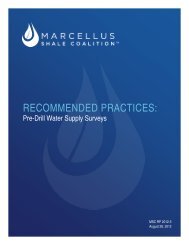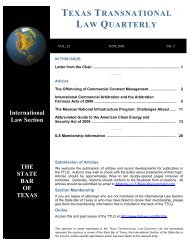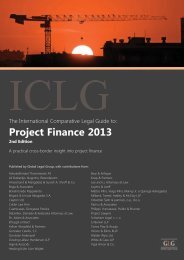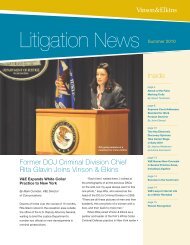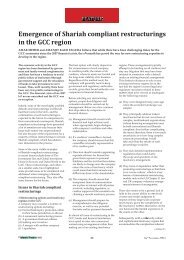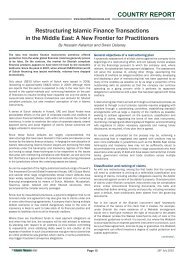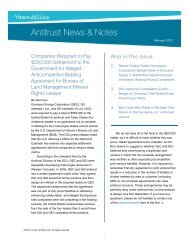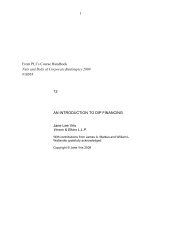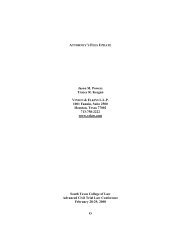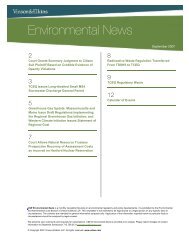Overview of U.S. Export Controls and Sanctions Issues Relating to ...
Overview of U.S. Export Controls and Sanctions Issues Relating to ...
Overview of U.S. Export Controls and Sanctions Issues Relating to ...
You also want an ePaper? Increase the reach of your titles
YUMPU automatically turns print PDFs into web optimized ePapers that Google loves.
ITAR meaning that, as a practical matter, it would not be possible <strong>to</strong> obtain U.S. government<br />
authorization for any ITAR controlled projects involving the PRC. See 22 C.F.R. (hereinafter<br />
“ITAR”) at § 126.1. As a result, PRC nationals <strong>and</strong> PRC companies could not be used <strong>to</strong><br />
support the development or production <strong>of</strong> any electric vehicle products or technologies that are<br />
ITAR controlled. Additionally, no ITAR controlled EV products could be sold for end use in<br />
the PRC.<br />
As a result, U.S. companies should carefully consider the implications <strong>of</strong> entering in<strong>to</strong><br />
any contracts with U.S. or foreign military entities, <strong>to</strong> ensure that products or technologies do<br />
not become “tainted” as ITAR controlled. The ITAR does not impose export licensing<br />
requirements on information that is in the “Public Domain” (a defined term in the regulations). Id.<br />
at § 120.11. However, the ITAR “Public Domain” definition is narrower than the “publicly<br />
available” designation under the EAR. Therefore, as a practical matter, its application tends <strong>to</strong><br />
be limited <strong>to</strong> situations where the U.S. government has <strong>of</strong>ficially approved the public release <strong>of</strong><br />
certain information or situations where institutions <strong>of</strong> higher learning are engaged in<br />
fundamental research.<br />
3. Restrictions on Transactions Under the OFAC <strong>Sanctions</strong><br />
OFAC is charged with the administration <strong>and</strong> enforcement <strong>of</strong> economic sanctions against<br />
embargoed countries (restricted countries) <strong>and</strong> against certain identified groups <strong>of</strong> individuals<br />
with respect <strong>to</strong> certain “regulated activities” (e.g., diamond trading, narcotics, terrorism <strong>and</strong><br />
proliferation). The most comprehensive sanctions are imposed against Cuba, Iran, Sudan (with<br />
exceptions granted for areas in Southern Sudan), <strong>and</strong> most recently Libya <strong>and</strong> Syria. Other<br />
countries, such as Burma (Myanmar) <strong>and</strong> North Korea are also subject <strong>to</strong> certain restrictions.<br />
OFAC maintains a list <strong>of</strong> SDNs (Specially Designated Nationals) which contains the names <strong>of</strong><br />
individuals <strong>and</strong> organizations known <strong>to</strong> be involved in regulated activities, or <strong>to</strong> support<br />
restricted countries.<br />
As a general matter, the sanctions apply <strong>to</strong> U.S. persons (U.S. citizens or lawful permanent<br />
residents) <strong>and</strong>, in some cases, other persons subject <strong>to</strong> U.S. jurisdiction which include foreign<br />
persons located in the U.S. Several <strong>of</strong> the sanctions programs explicitly restrict the activities <strong>of</strong><br />
non-U.S. persons. For example, under the Cuban sanctions, foreign companies owned or<br />
controlled by U.S. companies are treated as “U.S. persons” for the purpose <strong>of</strong> the sanctions.<br />
Under the Iran sanctions, non-U.S. persons are prohibited from re-exporting any U.S. origin<br />
goods that they know or have reason <strong>to</strong> know will be provided <strong>to</strong> Iran or <strong>to</strong> an Iranian national<br />
<strong>and</strong> have an export classification under the EAR other than EAR99.<br />
The OFAC sanctions restrict a variety <strong>of</strong> business activities (in addition <strong>to</strong> exports <strong>and</strong> imports),<br />
although the extent <strong>of</strong> such restrictions vary depending on the scope <strong>of</strong> the sanctions program.<br />
Restrictions may include the blocking <strong>of</strong> assets, restrictions on dealing in a property interest<br />
(which may include entering in<strong>to</strong> contracts or other financial transactions), <strong>and</strong> travel<br />
prohibitions.<br />
Although voluntary self-disclosure is taken in<strong>to</strong> consideration by OFAC as a mitigating fac<strong>to</strong>r for<br />
non-compliance, violations <strong>of</strong> the OFAC sanctions can result in criminal penalties (including<br />
fines ranging from $50,000 - $1,000,000 <strong>and</strong> imprisonment from 10 – 30 years) <strong>and</strong> civil<br />
penalties (which range from $11,000 - $1,000,000 per <strong>of</strong>fence, depending on the regula<strong>to</strong>ry<br />
scheme under which a particular sanctions program is promulgated). OFAC has an extremely<br />
aggressive enforcement scheme <strong>and</strong> has imposed stiff penalties on both U.S. <strong>and</strong> foreign<br />
companies in the last several years. See, e.g., OFFICE OF FOREIGN ASSETS CONTROL, “CIVIL<br />
11




